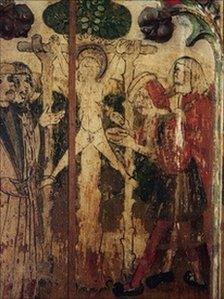What does 'blood libel' mean?
- Published

Jews were blamed for the alleged "ritual murder" of William of Norwich
US politician Sarah Palin's video message responding to Saturday's shooting in Arizona, which left six people dead and Congresswoman Gabrielle Giffords critically injured, included a reference to "blood libel". But what does the term mean?
"Within hours of a tragedy unfolding, journalists and pundits should not manufacture a blood libel that serves only to incite the very hatred and violence they purport to condemn," Mrs Palin said, external.
The term, while not widely used in America, has particular resonance with Jews, many of whom find it deeply offensive.
The allegations behind blood libel originate in the Middle Ages when Jews were falsely accused of ritualised murder, in particular the murder of children. The allegations were used to justify violence against Jews.
Amy Spitalnick, press secretary for the progressive pro-Israel group J Street, says the term invokes some of the worst accusations that have been made against Jews.
"Essentially it implies that Jews murder Christian and non-Jewish children to use their blood in Jewish rituals and holidays," Ms Spitalnick told the BBC.
"At one point it was tied in with Passover. Using the term would imply the using of non-Jewish blood for the baking of Matzah."
Blood libel myths run counter to Jewish theology which prohibits murder.
The Torah also forbids the consumption of animal blood - Kosher meat is drained of blood. Many Jewish scholars interpret the relevant Torah passage to also proscribe human blood.
A representative for the Center for Jewish History in New York referred the BBC to the definition of blood libel in the Encyclopaedia Judaica.
That reference work says that in addition to the accusations of murder, blood libel may connote "another form of the belief that Jews had been and still were responsible for the passion and crucifixion of Jesus Christ" and "popular beliefs about the murder-lust of the Jews and their bloodthirstiness, based on the conception that Jews hate Christianity and mankind in general".
'Nothing improper'
The term is rarely used in American politics; however when it is used, it generally refers broadly to a person or group being the subject of unpleasant and damaging accusations.
"While the term 'blood libel' has become part of the English parlance to refer to someone being falsely accused, we wish that Palin had used another phrase, instead of one so fraught with pain in Jewish history," Abraham Foxman, national director of the Anti-Defamation League, said in a statement.
Harvard University's Alan Dershowitz, a prominent lawyer and free speech advocate, told the website Big Government, external that there was nothing improper or anti-Semitic about Mrs Palin's use of the term, saying it had taken on "broad metaphorical meaning in public discourse".
"Although its historical origins were in theologically based false accusations against the Jews and the Jewish people, its current usage is far broader," he said. "I myself have used it to describe false accusations against the state of Israel."
'A dark time'
One of the earliest European versions of the blood libel story occurred in 12th Century England.
A dangerous, unfounded rumour that Jews had kidnapped a 12-year-old Christian boy, William of Norwich, and stabbed his head to simulate Jesus's crown of thorns was used to justify persecution of Jews.
While the Norwich account does not contain the element of the draining of blood and its ritual use, some experts suggest it is a story of the same type and generally seen as the entry point into England for such accusations.
Decades later, Pope Innocent IV launched an investigation into the claims, which eventually declared them false.
The blood myths persisted however, and were at times used to incite pogroms, or anti-Jewish riots.
In 1840, the disappearance of French Franciscan priest Father Thomas and his servant in Damascus, Syria, was blamed on the city's Jews.
Authorities helped perpetuate allegations that the priest was used in a ritual sacrifice. At least 13 Jews were incarcerated and probably tortured over the disappearance; four died.
The incident sparked an international backlash for both sides. American Jews staged protests, while some scholars claim it bolstered anti-Semitic attitudes in Europe and the Middle East.
During the 1930s, Nazi propaganda periodically explored accusations of Jewish ritual murder.
J Street president Jeremy Ben-Ami issued a statement on Wednesday on Mrs Palin's use of the term.
"We hope that Governor Palin will recognise, when it is brought to her attention, that the term 'blood libel' brings back painful echoes of a very dark time in our communal history when Jews were falsely accused of committing heinous deeds," he said.